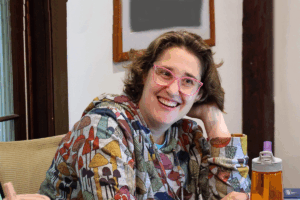Nathan Thoele is part of Mountain Valley’s leadership team, serving as the Residential Director. He leads a skilled team of residential counselors who work directly with MVTC residents on a 24/7 schedule. Nathan has a unique background that took him from working in summer camps, to AmeriCorps, to five years at the Vermont Institute of Natural Science as lead bird trainer and environmental educator. Today, he’s using his coaching and listening skills to ensure that MVTC is a safe and welcoming place for everyone.

What brought you to Mountain Valley?
I thought I wanted to be an ecologist, so I went to Prescott College to get a degree in something related to that. While on that journey, I realized that my favorite part about ecology was teaching it to people. I switched to an environmental education degree. After graduating, I moved to Vermont to put that degree into practice. I worked as a camp counselor, a conservation assistant, and an educator. After a couple of years of that, I landed at VINS and became one of their live bird show presenters, their primary bird trainer, and their volunteer trainer.
I got really into training people and learned that I liked coaching people to do specific and complex things. My job at VINS was to train people to train birds, and I enjoyed helping my co-workers make sense of the confusing parts of the job.
After being there for a while, I realized I wanted to work with people more than animals. I started looking for the next step in my career and found Mountain Valley. I specifically came here with the desire to practice my skill of listening. At VINS, someone pointed out that I seemed to have a profound desire to listen to people. I thought that seemed true, and when the job at Mountain Valley popped up, I took a leap of faith to try something new.
Tell us how your position has evolved over the last five years.
Originally, I was hired for an overnight residential counselor position. Everett Logan knew I was interested in more adventure- and outdoor-related activities, so he kept an eye out for a day shift position for me. Once it opened, I slid over and started some module facilitation. I created the Nature’s Classroom module, which is still very popular with residents today, though it looks a little different now. I also created a module about interpersonal skills that residents loved. After that, I moved up to a supervisor position, and then the Residential Director position opened. I applied and got it.
I’ve worked on every shift the residential team has—days, evenings, weekends, nights. That experience made me feel confident that I could serve Mountain Valley well as the Residential Director. I have a good perspective on what the residential staff are expected to do and how they do it.
What does a typical day look like for you?
I have 21 people on my team and directly supervise the supervisors for each shift. When I come into the office each day, I check to make sure we’re on top of any incidents and review my email to coordinate parent visits. Then it’s a lot of bouncing around—a lot of my job is checking in with other residential counselors and meeting with the supervisors multiple times per week. I also spend time with residents, and they’ll frequently ask me logistical questions about what is or isn’t allowed on campus, how home visits work, whether they can move their assigned laundry day, and so on. I answer them and try to have some deeper-level conversations as well.
Back at my desk, I spend time planning trainings for staff, coordinating with parents of residents, reviewing documentation, answering emails that ask complex questions, and handling a myriad of other clerical tasks. And, of course, I attend several routine meetings each week, in addition to impromptu meetings designed to address incidents as they arise.
What qualities do you look for when you’re hiring a new residential counselor?
I want residential counselors to have the impulse to trust residents rather than doubt them. In psychological terms, that’s unconditional positive regard and client-centered thinking. Beyond that, I want our staff to have good empathetic listening skills—listening geared toward empathy, not just cognitive understanding.
It’s important for our staff to balance setting firm boundaries with being flexible. We want our staff to engage with residents and be willing to embrace some discomfort alongside them. I can train some of this, but it’s important to be a people person.
What’s the most rewarding part of your job?
The time I get to spend with residents and the breakthroughs I witness. Just a few days ago, I was walking through the woods with one of our residents, who tends to avoid all emotional topics. I broached that subject with him and asked him why. We ended up having a very emotional conversation that ended with him kneeling on the ground in the forest and crying. He told me some things that I and other MV staff knew indirectly but that he had not said to anyone face-to-face before. It was a first for him and a profound moment for both of us.
I see the members of my team grow as professionals, and that always brings me joy. I’ve spent many afternoons having hard and crucial discussions with some of my staff as they grapple with the tough work we do. Witnessing them make sense of the work is truly special.
And finally, I am compelled to grow constantly. After five years, I am still challenged. Sometimes the challenge feels like too much, sometimes not enough. But overall, I like that I can look at who I was even just one year ago and see how much I have changed for the better. What I find most rewarding about this job is growth. We’re all growing all the time, and I love that.


